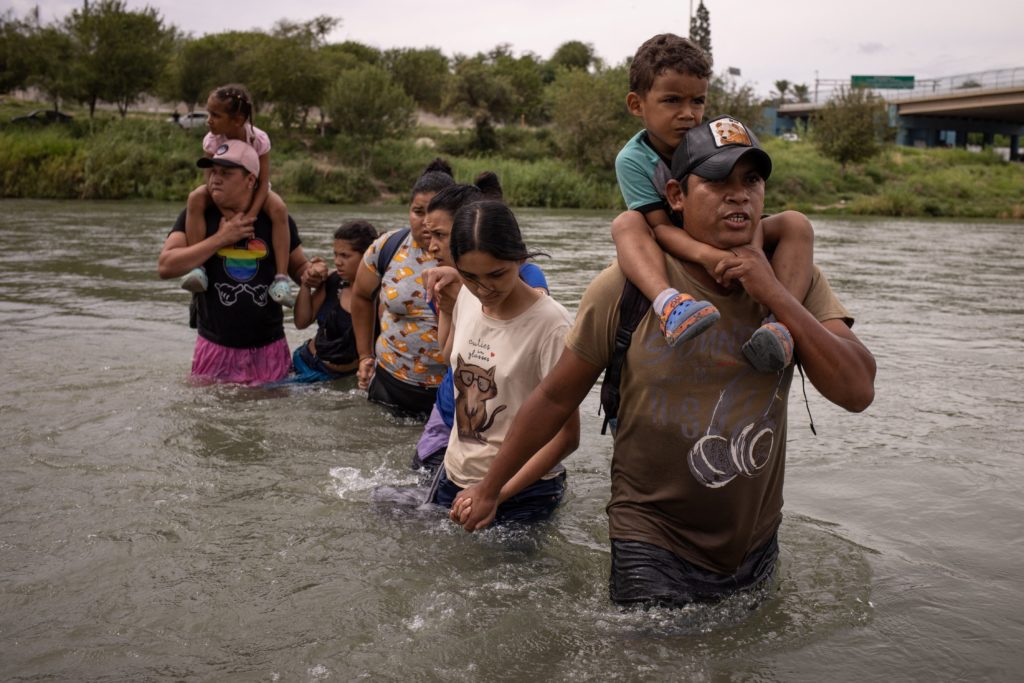The United States has a long history of embracing successive waves of immigrants and integrating them into a varied and colorful populace with a shared, stable national identity. We Americans are hugely proud of being a land of immigrants — a hospitable, open-hearted country which has for centuries offered the hard-working poor and oppressed of the world a welcoming home with opportunities to flourish. This is the story that we tell ourselves, and one that I believe in, having lived it myself, and seen so many others live as well.
We are that land, and we should be proud. But today, I think that this very legitimate pride risks interfering with a proper reaction to the humanitarian disaster which is our southern border. The correct reaction is horror, accompanied by a fierce desire to see order restored. Instead, we tend to equate an open border with kindness. It is anything but.
I’m not referring here to the heartlessness of letting an uncontrolled border facilitate the flow of fentanyl and other illicit drugs into our country, a tragedy that has resulted in more than 100,000 deaths each year. Nor am I referring to the exposure of Americans, especially those who live near the border but increasingly in the rest of the country, to violence from a criminal element that moves unconstrained by national boundaries.
My concern, rather, is with the unkindness of policies that entice a growing number of poor and vulnerable people to make an increasingly dangerous trek to our southern border.
The journey, which for most starts in South America, the crossing itself, and the aftermath, are rife with cruelty and violence. The victims of the poverty, corruption, and criminality of their own countries become victims again — this time of rape, prostitution, child labor, and human trafficking.
Recent reporting on the conditions in the Darien Gap, the 60-mile-wide dense jungle separating Colombia and Panama, which most migrants must cross, describe a tragic situation comparable to that of war zones. The Gap’s rough terrain, its frequent landslides, lack of roads, and drinking water, scorching heat, insects, venomous snakes, and crocodiles, are just the beginning of the migrants’ troubles.
The hordes of economic migrants (over half a million in 2023, and expected to be much higher this year according to Panama’s government) face much greater perils: The very people they pay to lead them through the jungle, their coyotes or traffickers, are just as likely as not to be members of the many narcotic and criminal gangs that roam the Gap, robbing, assaulting, raping, and killing the migrants with impunity. Even if the coyotes are not members of the Gulf Clan, Colombia’s largest drug cartel and a paramilitary group, they are certainly incapable of defending their charges from the cartel’s depredations.
The stories and statistics are chilling. The actual number of dead is hard to know, but is believed to be in the hundreds per year.
A recent New York Times report describes victims beaten and robbed of food, and even baby formula, “leaving people battered and starving in the forest. And the assaults often involve cases in which dozens of women are violated in a single event.”
Approximately one-fifth of the migrants are children, and half of those are under 5. Hundreds of children have been orphaned or separated from parents while going through the jungle, eventually becoming an “unaccompanied minor” with all the danger that entails (for instance, the U.S. reports losing track of 85,000 of them).
Adults and children who survive the journey through the jungle are housed in detention centers in Panama, awaiting to board a bus to the Texas border, with free passage granted by the intervening countries. This means, effectively, that our own southern border has been outsourced to Panama, as one Panamanian government official recently put it.
Arriving in the U.S. traumatized, robbed, sometimes orphaned or raped, migrants’ troubles continue. They have to pay their traffickers and the cartels they work for, often through labor and sex slavery. Children are not exempt, as the Labor Department reports that child labor cases have risen steeply, with some jobs being dangerous or brutal. The children in inadequate foster care, left with sex traffickers, or simply “lost” to the system, present nightmarish possibilities to the imagination.
I cannot blame a single man, woman, or child living in one of the many hellscapes of our hemisphere, be it Haiti, Venezuela, or Cuba, for accepting the invitation of a disordered U.S. immigration policy. But if we have sent a signal that all are welcome — even as we have no plan to successfully assimilate them, are not blessed with infinite resources for them, and have not talked about how fair this is to vulnerable Americans — we have made ourselves responsible for the migrants’ suffering.
Thinking of ourselves as a kindhearted and openhanded nation may be, at this point, a huge mistake. The depravity, violence, and heartbreak that our policies are driving in the already-miserable lives of our neighbors make us downright cruel, no matter how good our intentions.

